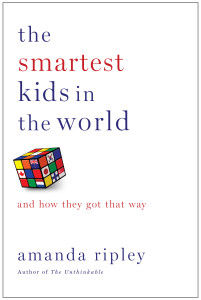I’ve heard a lot lately about The Smartest Kids in the World by Amanda Ripley. Ripley is a journalist who set out on an adventure to find out what makes the smartest kids in the world…the smartest kids in the world. She followed three teenagers who participated in exchange programs to Finland, South Korea, and Poland. The book talks a good bit about the adventures of these three students. There are several things that are interesting about their experiences…but not a lot of nuggets that can be practically implemented.
I read this book with both my parent hat and my principal hat on. As the principal of a Christian high school, I finished this book feeling very good about what we are doing to challenge our students in the areas of critical thinking and collaboration. I also walked away from reading this with a refreshed sense of gratitude for the opportunity I have been given to have a seat the decision-making table at our school. I realize that many principals around the world have no say in what they do on a daily basis…no real buy-in either past their paycheck. In my role, I am particularly motivated by my philosophy of Christian education to invest in the hearts and minds of our students such that they will truly impact the world for Christ. In order to have that type of influence, they must be excellent in whatever career path they ultimately pursue. Another area where I am blessed to have a lot of input is in the hiring process. Ripley’s book shows that many schools have a terribly broken staffing process whereby bad teachers are hired…and then kept for a long time. Our goal is always to hire excellent teachers and then to do everything we can as a team to make each other better as we grow and learn together.
My prayer and hope is that the students I serve each day will truly be amongst the smartest kids in the world…that are making an impact for the cause of Christ. My desire is that they will choose to spend their lives on something that will last for all of eternity.
I highlighted several things while reading and have posted those notes below…
- This strange new test was called PISA, which stood for the Program for International Student Assessment. Instead of a typical test question, which might ask which combination of coins you needed to buy something, PISA asked you to design your own coins, right there in the test booklet.
- The world needed an even smarter test, one that could measure the kind of advanced thinking and communication skills that people needed to thrive in the modern world.
- “We were not looking for answers to equations or to multiple choice questions,” he said. “We were looking for the ability to think creatively.” Andreas Schleicher about nuances of the PISA
- PISA wasn’t measuring memorization; it was measuring aspiration.
- The Finns decided that the only way to get serious about education was to select highly educated teachers, the best and brightest of each generation, and train them rigorously.
- That mindset had worked alright for most American kids, historically speaking. Most hadn’t needed a very rigorous education, and they hadn’t gotten it. Wealth had made rigor optional in America. But everything had changed. In an automated, global economy, kids needed to be driven; they need to know how to adapt, since they would be doing it all their lives. They needed a culture of rigor.
- The stories of Finland, Korea, and Poland are complicated and unfinished. But they reveal what is possible. All children must learn rigorous higher-order thinking to thrive in the modern world. The only way to do that is by creating a serious intellectual culture in schools, one that kids can sense is real and true. As more and more data spills out of schools and countries, and as students themselves find ways to tell the world how much more they could do, these counter narratives will, I hope, become too loud to hear.
Categories:


